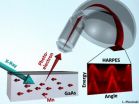(Press-News.org) Avastin, or Bevacizumab, has been shown to increase survival from bowel cancer in around ten to 15 per cent of patients, but it has been impossible to predict who will benefit.
Avastin works by targeting and blocking the VEGF-A protein, two major forms of which are VEGF165 and VEGF165b.
VEGF165 helps cancers to grow new blood vessels, so they can get food and oxygen from the blood - all cancers need a blood supply to be able to survive and grow. Its sister protein, VEGF165b, has the opposite effect and acts as a brake on this growth.
Cancer Research UK funded scientists at the University of Bristol looked at the effect Avastin had on patients with different levels of VEGF165b and compared this with patients who were not given the drug at all.
Those with low levels of VEGF165b survived three months longer without the disease progressing compared to patients not treated with Avastin. But patients with higher levels of the protein saw no benefit from Avastin and survived no longer than as those who were not given the drug.
Avastin blocks both forms of VEGF-A, so in patients with lower levels of VEGF165b more Avastin may be available to block the blood vessel promoting protein VEGF165, eventually starving the cancer.
Professor David Bates, lead researcher from the University of Bristol's School of Physiology and Pharmacology, said: "Avastin has shown great potential for a minority of people with bowel cancer, but it's been impossible to predict who will benefit from the drug. Currently, Avastin is not approved by NICE for patients with advanced bowel cancer because they feel that the benefit to an unknown minority of patients does not justify the cost of treatment.
"We now need to look at cancer samples from a larger group of patients about to start taking Avastin and determine if the amount of VEGF165b can accurately identify those patients that will benefit and so potentially open a new treatment option for some people with advanced bowel cancer."
Bowel cancer is the third most common cancer in the UK with around 41,000 people diagnosed each year. Survival rates have doubled over the last 40 years but 16,000 people still die from the disease.
Dr Julie Sharp, senior science information manager at Cancer Research UK, said: "New targeted treatments can be hugely beneficial for certain patients, depending on the characteristics of their tumour. But, we don't always know who these patients are. This work takes researchers a step closer to developing a suitable test so doctors can give Avastin to those people it will really make a difference to."
### END
Protein levels could predict if bowel cancer patients will benefit from Avastin
2012-10-24
ELSE PRESS RELEASES FROM THIS DATE:
Penn Medicine researchers map strategy for 'choosing wisely' on low-value health care services
2012-10-24
PHILADELPHIA – Cutting the expenses associated with "low-value" medical tests and treatments – such as unnecessary imaging tests and antibiotics for viral infections that won't benefit from them – will require a multi-pronged plan targeting insurance companies, patients, and physicians, according to a JAMA Viewpoint article published this week by researchers from the Perelman School of Medicine at the University of Pennsylvania. These efforts transcend economic impact, however, and may also be essential for improving health care quality and patient safety.
The piece follows ...
Limitations to the 'revolutionary' findings of online studies
2012-10-24
'Direct to consumer' research, using data obtained through increasingly popular online communities such as 23andMe, PatientsLikeMe and the Personal Genome Project, has methodological limitations that are known to epidemiological studies, including selection bias, information bias, and confounding. These limitations mean that the results and conclusions of research using these methods need to be interpreted with caution, according to a paper published in the journal PLoS Medicine.
Cecile Janssens, PhD, formerly of the Erasmus University Medical Center in The Netherlands ...
Study: Amish children are 2 times more physically active than non-Amish children
2012-10-24
BALTIMORE, Md. – Oct. 23, 2012. Old Order Amish children are much more physically active and three times less likely to be overweight than non-Amish children, which may provide them with some long-term protection against developing Type 2 diabetes, University of Maryland School of Medicine researchers report in the journal Diabetes Care.
The researchers found that Amish children in Lancaster County, Pa., spent an additional 34 minutes a day in light physical activity, plus another 53 additional minutes a day in moderate to vigorous activity compared to non-Amish white ...
Neuroscientists propose revolutionary DNA-based approach to map wiring of whole brain
2012-10-24
Cold Spring Harbor, NY -- A team of neuroscientists has proposed a new and potentially revolutionary way of obtaining a neuronal connectivity map (the "connectome") of the whole brain of the mouse. The details are set forth in an essay published October 23 in the open-access journal PLOS Biology.
The team, led by Professor Anthony Zador, Ph.D., of Cold Spring Harbor Laboratory, aims to provide a comprehensive account of neural connectivity. At present the only method for obtaining this information with high precision relies on examining individual cell-to-cell contacts ...
Twitter principles of social networking increase family success in nesting birds
2012-10-24
New research carried out by scientists at Universities in Exeter, France and Switzerland reveals for the first time the importance of social networking in producing a successful family.
The study found that, regardless of how big and healthy individual chicks are, what really matters to their chances of surviving and breeding is how siblings in the nest interact with each other, with cooperative families faring best.
Differences in patterns of feeding between mothers and fathers were a key factor in determining the behaviour of their offspring, according to the study ...
Summer babies less likely to be CEOs: UBC research
2012-10-24
Sauder School of Business researchers at the University of British Columbia have found that a person's date of birth can affect their climb up the corporate ladder.
The Sauder study shows that only 6.13 per cent of an S&P 500 CEO sample was born in June and only 5.87 per cent of the sample was born in July. By comparison, people born in March and April represented 12.53 per cent and 10.67 per cent of the sample of CEOs.
"Our findings indicate that summer babies underperform in the ranks of CEOs as a result of the 'birth-date effect,' a phenomenon resulting from the ...
Blood chromosome differences are linked to pancreatic cancer
2012-10-24
MADISON – A new study shows that a blood marker is linked to pancreatic cancer, according to a study published today by scientists at the University of Wisconsin Carbone Cancer Center and Mayo Clinic.
First author Dr. Halcyon Skinner, assistant professor of population health sciences at the University of Wisconsin School of Medicine and Public Health, says the study is the first time pancreatic cancer risk has been linked to differences in telomeres' length in blood cells.
"This suggests a new avenue to identify those with pancreatic cancer or those at risk of developing ...
Genetic patterns of deep-sea coral provide insights into evolution of marine life
2012-10-24
The ability of deep-sea corals to harbor a broad array of marine life, including commercially important fish species, make these habitat-forming organisms of immediate interest to conservationists, managers, and scientists. Understanding and protecting corals requires knowledge of the historical processes that have shaped their biodiversity and biogeography.
While little is known about these processes, new research described in the journal Molecular Ecology helps elucidate the historical patterns of deep-sea coral migration and gene flow, coincident with oceanic circulation ...
New finding could pave way to faster, smaller electronics
2012-10-24
University of California, Davis, researchers for the first time have looked inside gallium manganese arsenide, a type of material known as a "dilute magnetic semiconductor" that could open up an entirely new class of faster, smaller devices based on an emerging field known as "spintronics."
Materials of this type might be used to read and write digital information not by using the electron's charge, as is the case with today's electronic devices, but by using its "spin."
Understanding the magnetic behavior of atoms is key to designing spintronics materials that could ...
New paper examines shifting gears in the circadian clock of the heart
2012-10-24
A new study conducted by a team of scientists led by Giles Duffield, assistant professor of biological sciences and a member of the Eck Institute for Global Health at the University of Notre Dame focuses on the circadian clock of the heart, and used cultured heart tissue. The results of the new study have implications for cardiovascular health, including daily changes in responses to stress and the effect of long-term rotational shift work.
Previous studies by a research group at the University of Geneva demonstrated a role for glucocorticoids in shifting the biological ...

